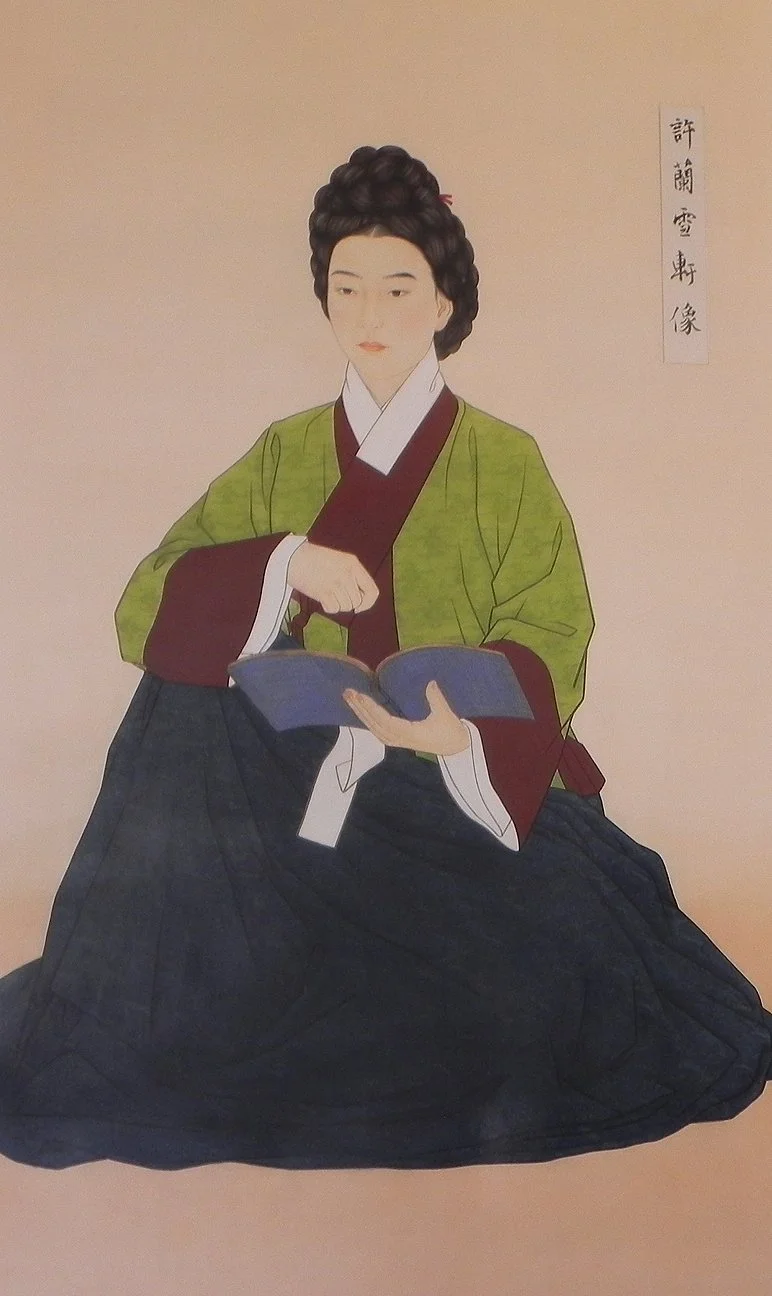“Borrowing an Elder Brother’s Poem for Looking Back from a High Plateau’s Pavilion”, by Nansŏrhŏn (translated by Ian Haight and T’ae-yong Hŏ)
Translator’s Introduction
“Borrowing an Elder Brother’s Poem for Looking Back from a High Plateau’s Pavilion” is excerpted from the manuscript Spring Mountain: Complete Poems of Nansŏrhŏn. The poem was translated from hanmun, which is classical Chinese used by Korean scholars of the 16th century to write literature. Nansŏrhŏn—meaning “White Orchid”—is the penname of Hŏ Ch’ŏhŭi (1563-1589), a Korean noblewoman.
As a noblewoman of the 16 th century writing poetry, Nansŏrhŏn faced tremendous obstacles. Noblewomen in this period were generally not given a classical education on a par with noblemen; it was socially unacceptable for noblewomen to paint, sing, learn music, or write poetry, because learning such arts would have equated the noblewoman with a courtesan. Courtesans learned to sing, paint, and write poetry so that they could entertain noblemen. A noblewoman who did write poetry had to do so privately, and share her writing with only a select few. As a child, Nansŏrhŏn was an exception to these social norms because she was a prodigy, her family placed a high value on literary learning, and her father allowed the education, despite misgivings he may have had as a Confucianist, actively serving in the court of the king.
Her upbringing was socially liberal, but Nansŏrhŏn was sequestered from the world, and moved far from her family when she had an arranged marriage at the age of 12. A soothsayer said the marriage would help Nansŏrhŏn overcome health problems, and live a long life. Nansŏrhŏn died at the age of 27, and there is speculation she may have committed suicide.
“Borrowing an Elder Brother’s Poem for Looking Back from a High Plateau’s Pavilion” imagines her elder brother Hagok’s travels into exile: each section of the poem represents a different experience of the journey. Hagok was an ardent supporter of Nansŏrhŏn, and made all the arrangements for her education, perhaps also acting as a surrogate father, while her real father was far away from their family home in service of the king. Hagok’s liberal way of thinking won him few friends at court, however, and he later died from alcoholism while in exile.
Borrowing an Elder Brother’s Poem for Looking Back from a High Plateau’s Pavilion
I
Below a pavilion on a mountain peak, a pillar presses
into earth.
In the northeast, drifts of clouds
lightly caress
the distant borders.
In Chulwon Valley, dragons long ago left
a newly-founded dynasty—
near nobles’ tombs, burnt hues
of autumn. Geese pass
overhead.
A mountain range, lithesome,
limits the broad plateau, spreads across three counties—
a river cut
into nine canals
divides
the plain.
After my day’s climb, I see
the sun’s twilight—
overwhelmed, leaning on my sword’s hilt,
I sing a forlorn song
friendless.
II
Atop a teetering ladder, I cut through clouds—
snow-tipped summits invade
the sky, mark Chinese lands. The range
ends near Three Rivers County—
the eastern landscape rolls
the rivers far away. A smudging
air of dust
wisps
into evening—
the lone castle of my friend
on the horizon.
Pastures of grass
please 10,000 horses,
fattened early for winter.
Looking east, a small keep beats its drums,
wishing to be led
by a cunning
general.
III
Ahead, the rock-ridden path rises into mountain mist—
my horse’s hooves tread onward.
The trail ends.
I rest at the pinnacle, as if in the sky.
This late season of harvest
a dragon bellows from the depths
of water hollows.
Drizzling rain subsides.
An arc of colors glistens above falls.
A general’s drums and flutes
beat
a hastened march
to the borders—
a prize princess, a token
of peace
for the Huns, intones
her sorrow
through lute strings.
Soldiers devoted to the King
sing “Leaving the Castle” at dusk—
their lotus-engraved swords
hungry
in petal-carved scabbards.
IV
Over 10,000 li, proudly,
the general’s swords advance—
a white granite tower
crowns a mountain, stands
in slanting sunlight
in the sky.
A river streams west
along three counties—
a southern range bends, obscures
a plain’s grasslands.
Clouds thicken, then rise below me—
in my eyes, the great ocean,
vague, distant—
climbing ever higher,
I turn back:
a horse from the borders
whinnies in wind
hungry for war.
Ian Haight’s collection of poetry, Celadon, won Unicorn Press’ First Book Prize. With T’ae-yong Hŏ, he is the co-translator of Spring Mountain: Complete Poems of Nansŏrhŏn and Homage to Green Tea by the Korean monk, Ch’oŭi, both from White Pine Press. Other awards include Ninth Letter’s Literary Award in Translation, and grants from the Daesan Foundation, the Korea Literary Translation Institute, and the Baroboin Buddhist Foundation. Poems, essays, interviews, reviews, microfiction and translations appear in Barrow Street, Writer’s Chronicle, Hyundai Buddhist News, Full Stop, MoonPark Review and Prairie Schooner.
Nansŏrhŏn (1563-1589, penname “White Orchid”) was a sequestered noblewoman who lived during the sixteenth century in Korea. Considered by many Korean scholars to be Korea’s greatest female poet, she died at the age of twenty-seven.
T’ae-yong Hŏ has been awarded translation grants from the Daesan Foundation and Korea Literature Translation Institute. With Ian Haight, he is the co-translator of Borderland Roads: Selected Poems of Kyun Hŏ and Magnolia and Lotus: Selected Poems of Hyesim—finalist for ALTA’s Stryk Prize. Working from the original classical hansi, T’ae-yong’s translations of Korean poetry have appeared in Agni, New Orleans Review, and Atlanta Review.
Nansŏrhŏn
